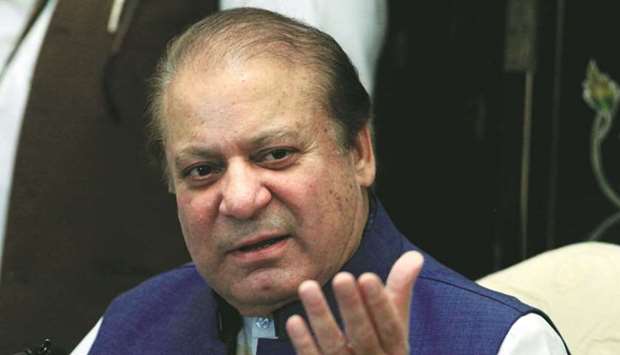The government is still awaiting the recommendation of the provincial health department regarding former prime minister Nawaz Sharif’s treatment, despite recommendations of the specialised medical board comprising senior doctors which was formed on the instructions of the government, it was learnt.
The specialised medical board had on February 19 forwarded their recommendations to the Punjab home department, which was confirmed to the media by a board member, Allama Iqbal Medical College principal Professor Dr Arif Tajamul.
The report sent to the provincial home department, according to the senior doctor, declared Sharif’s condition as satisfactory.
It refuted the claims made by members of his party, the Pakistan Muslim League – Nawaz (PML-N), that his health situation is life-threatening.
The report, however, suggested an angiography for the former premier.
The board of doctors also reviewed his medical history before drafting their recommendations for the government.
After receiving the recommendations of the board, the Punjab home department forwarded them to the Punjab health department to seek their opinion.
According to the concerned home department official, the recommendations of the medical board were not clear enough for the department to arrive at any conclusion.
He said that the board declared Sharif’s situation to be under no life threat, but mentioned the need for cardiac cathertisation with certain prerequisites.
He added that the recommendations had been forwarded to the health department for their opinion, and that they are still waiting for it.
On the other hand, the medical superintendent (MS) at Jinnah Hospital stated that doctors had given straightforward recommendations to the best of their knowledge and experience, and that the decision for further treatment and course of action lies with the home department.
Sharif’s personal physician Dr Adnan Khan, while speaking to the media, also denied rumours that his patient had refused medical treatment.
He said that there is no chance of refusal as the former premier had not been offered treatment by the government.
Dr Khan added that hospital authorities are also waiting for instructions from the government.
Responding to a question, he said that the government and Allama Iqbal Medical College’s Dr Tajamul would be responsible if anything were to happen to Sharif.
Maryam Nawaz and Shehbaz Sharif have visited Sharif at Jinnah Hospital.
In his response to media queries, Shehbaz Sharif condemned the arrest this week of Sindh Assembly Speaker Agha Siraj Durrani, but did not comment about his brother’s medical treatment or health.
Nawaz Sharif’s daughter Maryam, meanwhile, refused to answer any questions.
A senior official of the Punjab home department said that as Nawaz Sharif is a leader of big stature, no one, including medical boards, the home department, and the provincial government, wants to take responsibility for anything.
He added that the government is being circumspect in handling the matter as there was no urgency in it.
Thrice-elected former prime minister Nawaz Sharif was shifted to Jinnah Hospital from Kot Lakhpat prison on February 15 – the second time in the month that he has been moved to a hospital.
Earlier, he was moved to Service Hospital on February 2 after a special medial board recommended that he needed a multidisciplinary health facility for multiple check-ups.
However, Nawaz Sharif refused to get any further check-ups after three days, and insisted on being moved back to jail.
Subsequently, on February 7, after staying in Services Hospital for five days, he was moved back to Kot Lakhpat Jail.
Just two days after his return behind bars on his own demand, his personal physician wrote to the home department, requesting that the government take into consideration the recommendations of the medical board, which had suggested shifting Nawaz Sharif to a cardiac facility.
In view of that request filed by Dr Khan, the government moved Nawaz Sharif to Jinnah Hospital.

Nawaz Sharif
